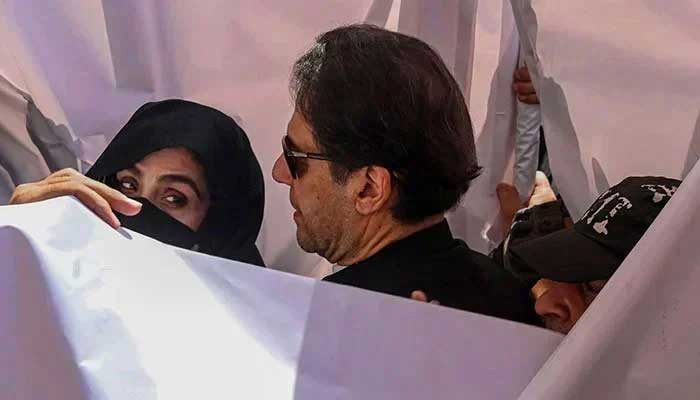Imran Khan, Bushra Bibi challenge conviction in £190m case
"There are discrepancies in evidence provided by prosecution," says lawyer
January 27, 2025

ISLAMABAD: Pakistan Tehreek-e-Insaf (PTI) founder Imran Khan and his wife, Bushra Bibi, have challenged their conviction in the £190 million case in the Islamabad High Court (IHC).
An accountability court in Islamabad convicted the former prime minister and the former first lady in the £190 million case in a much-anticipated ruling earlier this month.
In a major blow to the already incarcerated politician, Accountability Judge Nasir Javed Rana handed down a 14-year sentence to the PTI founder and a seven-year sentence to his wife, while also slapping heavy fines on them.
The case, also known as Al-Qadir Trust case, involved allegations that Imran and some others in 2019 adjusted Rs50 billion — amounting to £190 million at the time — sent by Britain's National Crime Agency (NCA) to the Pakistani government during his tenure as the country's prime minister.
The former ruling party strongly rejected the verdict that came after multiple delay over weeks, announcing to reach out to superior courts against it.
The petition, filed via Salman Akram Raja and Barrister Salman Safdar, focused on arguments and evidence refuting the claims presented by the prosecution in the notorious graft case.
It said that the conviction of Khan and his spouse was a result of political victimisation "orchestrated by opponents using NAB as a tool", while the former premier already faced "280 politically motivated cases", many of which ended in acquittals.
The plea contended that the trial court misread the evidence and failed to consider critical facts, rendering the conviction unsafe.
Referring to a Supreme Court ruling in the National Accountability Bureau (NAB) Amendments case, according to which the anti-graft watchdog cannot try cases involving allegations of corruption and monetary gain by public officeholders unless the prosecution presents evidence of such material gain, the plea contended that filing of the reference by NAB was beyond its jurisdiction.
"Despite this, NAB exceeded its jurisdiction by filing the false and frivolous NAB Reference No 19 of 2023, fully aware that the case did not fall within the ambit of the NAO, 1999," it read.
It also highlighted that the trial court overlooked the prosecution’s "most critical failure" — its inability to produce any witnesses either from the United Kingdom (UK) or Pakistan to substantiate the alleged proceedings at the NCA.
The petition referred to a UK Court of Appeal ruling that clarified that the funds transferred were not proceeds of crime, contradicting the prosecution’s claims, and highlighted NAB's alleged failure to provide key evidence or witnesses from the UK or Pakistan.
"Its [NAB's] failure to produce witnesses from the National Crime Agency (NCA) or submit relevant documents has dealt a fatal blow to its case," it read.
The petition highlighted Khan's contributions to healthcare and education, which were contrary to the allegations, and refuted the allegations of personal financial benefits from the Al-Qadir Trust.
The petitioners also criticised the trial for being rushed and conducted under undue pressure, compromising the principles of natural justice, in the plea.
It also called out the Khan's arrest from the IHC's premises on May 9, 2022, in violation of section 24 of NAO, 1999.
Conviction in the £190 million case came as the latest legal setback for the cricketer-turned-politician, who has been in jail since August 2023, even though all four convictions handed down to him have either been suspended or overturned.











